-
by Admin
15 February 2026 5:35 AM



On September 12, 2024, the Allahabad High Court, in Smt. Hasina Bano vs. Mohammad Ehsan, set aside a Family Court ruling that dismissed a suit for the declaration of divorce by mutual consent (mubara’at) under Muslim Personal Law. The Court held that no limitation period applies to matrimonial status declarations and dismissed the Family Court's decision based on delay and technical grounds regarding the non-submission of the original Talaqnama.
The case stemmed from the marriage of Smt. Hasina Bano and Mohammad Ehsan, solemnized in 1984. The couple had mutually agreed to divorce by mubara’at (mutual consent) in 1999, and a notarized Talaqnama was executed in 2000. Living separately since 1990, they jointly sought a declaration of their divorce in 2021. However, the Family Court dismissed their suit on October 10, 2023, citing a delay of 20 years in filing and the non-submission of the original Talaqnama.
The Family Court dismissed the case, invoking the Limitation Act, 1963, arguing that a 20-year delay barred the suit. The High Court found this erroneous, noting that Section 29(3) of the Limitation Act explicitly exempts matrimonial cases from limitation periods. The Court clarified that under the Family Courts Act, 1984, there is no time bar for seeking declarations of matrimonial status. "In matters of marital status, the cause of action is continuous," the Court observed.
The Family Court also faulted the appellants for not submitting the original Talaqnama. The High Court, referencing Section 58 of the Indian Evidence Act, 1872, held that facts admitted need not be proven. Since the respondent had never disputed the divorce or the Talaqnama's authenticity, the Family Court's insistence on the original document was unnecessary. The High Court accepted the Talaqnama as additional evidence.
The Allahabad High Court allowed the appeal, overturning the Family Court's judgment. The Court ruled that the technical grounds on which the Family Court dismissed the suit were legally unsound. It emphasized that declarations of divorce by mutual consent (mubara’at) under Muslim Personal Law are valid when both parties agree, regardless of the time elapsed. Furthermore, since the Talaqnama's authenticity was never disputed, dismissing the case for non-submission of the original document violated the principles of justice.
The Court cited Section 29(3) of the Limitation Act, holding that the Limitation Act does not apply to marriage or divorce-related suits, as they are recurring causes of action.
The High Court referenced previous cases, notably Shayara Bano vs. Union of India (2017) and Asbi K.N. vs. Hashim M.U. (2021), to establish that divorce by mubara’at under Muslim Personal Law requires no strict formalities, oral or written, and is valid upon mutual consent.
On the issue of delay, the Court reiterated that "substantial justice must prevail over technical considerations" and that matrimonial cases involving continuing status cannot be dismissed on mere technicalities like time delay.
The Allahabad High Court decreed that the matrimonial status of the parties was indeed divorced and overturned the Family Court’s decision. The Talaqnama, though not originally submitted, was acknowledged, and the case was resolved in favor of the appellants.
Date of Decision: 12/09/2024
Smt. Hasina Bano vs. Mohammad Ehsan
